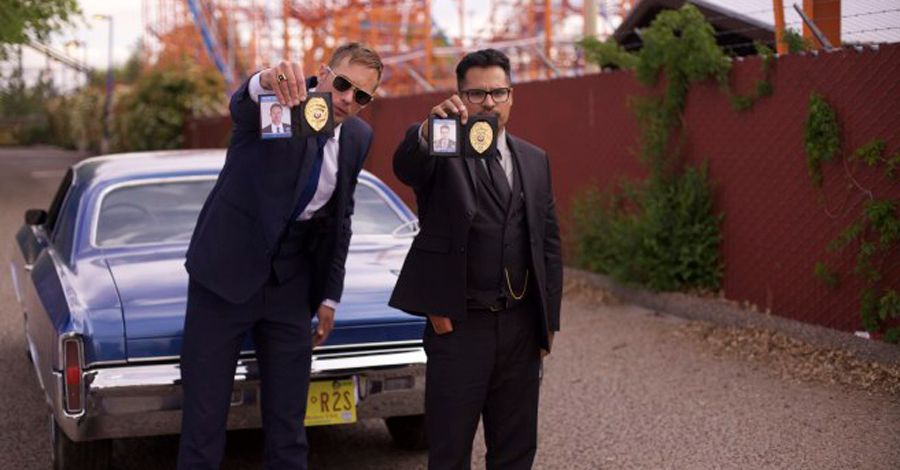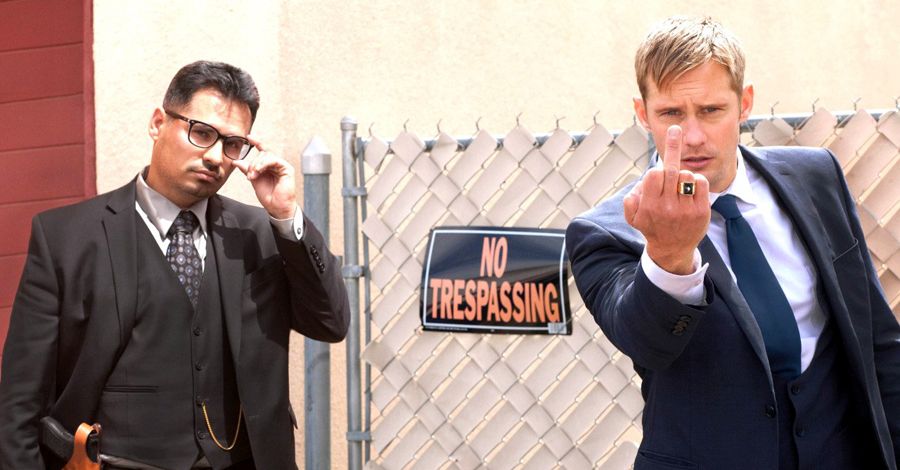"War on Everyone" isn't for everyone. The cop comedy goes for the jugular with its hard-hitting humor and even harder-hitting violence.
However, its opening scene provides the perfect introduction to the warped sense of humor of writer-director John Michael McDonagh: Two cops, Bob and Terry, in a vintage muscle car are blazing down a back alley in hot pursuit of a mime. Yeah, a mime. With a smirk on his face, Bob ("Ant Man's" Michael Peña) asks Terry ("True Blood's" Alexander Skarsgård ), "If you hit a mime, does he make a sound?"
They find out, as they into the face-painted imp, who flies over their hood, his mouth contorted wide in a silent scream. This is the world of "War on Everyone," where the cops are crooked, the humor is barbed and the violence is bonkers.
SPINOFF sat down with McDonagh and stars Peña and Skarsgård to discuss the SXSW headliner, which drew howls from the audience at its Saturday premiere. We discussed the trick of pulling off politically incorrect humor, the film's incredible cast, and the freedom of playing grade-A assholes.
Spinoff: I want to quickly apologize, because I was sitting behind you all at the premiere last night and I was super loud.
Alexander Skarsgård: [Laughs.] Were you snoring? (Pena and McDonagh laugh.)
No! But at one point in the Iceland sequence, I laughed so hard I went into a coughing fit. But I want to begin by talking about the opening scene with the mime getting run down because it sets the tone of the humor. Where did the running-down-a-mime idea come about?
John Michael McDonagh: I just don't like mimes. (They all laugh.)
Michael Peña: You don't like mimes? That seems like the opening line in therapy. "I just don't like mimes."
Skarsgård: (affecting a tough-guy tone) I fucking hate them!
McDonagh: But as you say, it sets up the whole tenor of the film, just that one scene.
Skarsgård: That's why you want to spend three days shooting it, you're like "Hit him again!"
Three days?
Skarsgård: No, no, no. I'm kidding.
Oh, because there was a lot of shot variety, but --
Peña: That was a big hit, though. The guy had fly over the hood and all.
A lot of times people use the term "equal-opportunity offender" as a kind of protector of where people can just say whatever. But this movie really is an equal-opportunity offender, where it challenges everyone to not take anything to seriously.
McDonagh: Yeah. Well, once you set up those characters, you can then go anywhere with them, which is quite freeing as a writer. You just put them in really offensive situations, one after the next, with slight builds. But yeah, as the title says, it's "War on Everyone."
Peña: But also people call [Bob and Terry] names.
Skarsgård: Yeah.
Peña: But they react to those names are just like (he shrugs) ... Like you (gesturing to Skarsgård) say in the movie, "Fucking pigs." They don't really give a shit.
So as an actor is that freeing or anxiety-inducing to take on a script that is this potentially offensive?
Skarsgård: I was so excited, because, like, back to the mime scene -- I had just done "Tarzan," which is tonally quite a different movie, very intense, and it was a long eight-month script. So when I got this script, I was obviously familiar with John's work and a big fan of "Calvary" and "The Guard," and I open page one and it's like, "they hit a mime and steal his cocaine." I'm like, "Yeah!" When you set it up that way and establish these characters and the fact that they offend everyone: There's no prejudice. They just go after everyone.
You two have such an incredible chemistry and the dialogue is so rapid-fire between you. How did that develop?
McDonagh: We had a week's rehearsal, didn't we? I think it was a week.
Skarsgård: Yeah.
McDonagh: I don't know about you guys, but I think more than a week or more than two weeks is too much. Doing none is bad.
Skarsgård: But I remember we all met up in Albuquerque [where the film was shot], and we (gesturing to Pena) had never met before.
Peña: I didn't know that you didn't meet him (gestures to McDonagh) before too!
Skarsgård: Yeah, but we got together and had, like, a five-hour scheduled rehearsal. And we sit, go through the script and after John is kind of watching Mike and myself. We're kind of talking, doing our thing, and after about an hour, John's is like, "You guys hungry? Want to go to lunch, grab a couple of pints?" So that was it, kind of. Because we (pointing to Pena) found a rapport early on. We have the same sense of humor and understood each other.
Michael's done comedy before, and this plays kind of halfway between "End of Watch" and "Ant-Man," like this weird between zone of dark humor that works really well. But, Alexander, you're not known for comedy in the U.S. Was that something you were looking to do more of?
Skarsgård: Yeah, I did a couple of comedies in Sweden before I moved over to the States. I was not a comedic actor, but was in a couple of comedies and really loved it. And then for some reason I ended up working on more dramatic roles here in the States. And I did a couple of days on "Zoolander" and I did a couple of days on "Eastbound and Down," and I just had so much fun doing that. So I was definitely looking for something. And this was the tone I love, where it's dark and has some depth and character but is also very funny. And I again after doing "Tarzan" for eight months, I was so ready to do something where a character does more kind of aaahh! (Throws his arms up and makes a sort of manic scream face). You know, is kind of more out there, crazier.
Was there any sacred cow that seemed too sacred to mock?
McDonagh: Nah. I saw a review of the film. It was a good review. It listed all the people that were attacked in the film, basically.
Peña: He loves it! Anything that's remotely bad that's said about the film, he loves it. "You know what this person said!?" (Skarsgård laughs.) He loves it.
McDonagh: But among the people they said I attacked, they said the guy with Downs Syndrome who's walking the dog when Terry gets thrown out of the van. And I was like, "But there is no attack on that guy. He's just there." And I wondered why that popped out at the person. And you realize it's because people with disabilities are never cast in movies just as a regular person. There always cast as someone that the hero has to commiserate with and feel sorry for. But when you cast somebody just as an extra basically, that kind of popped out. And they thought that means it’s a joke at his expense.
Peña: But he's actually really sweet!
McDonagh: Yeah. He's just kind of giggling at the dog licking Terry's face, and that's all it is.
It's actually funny you got that response, because I think part of the reason the humor works so well is that the cast is so diverse in its representation. So it doesn't feel like the majority mocking the marginalized. I was a bit shocked that "War on Everyone" had me laughing at police brutality. How do you work that into being funny and not just disturbing?
McDonagh: Yeah, you're basically laughing at people doing completely reprehensible things. And that does happen in real life quite often. Today you can run into the error of the audience feeling complicit with what they are doing in some way, as if that's a good thing. I think we walk that tight rope quite well.
Skarsgård: I think the problem in our society is that there's a police force that is not connected to the neighborhoods that they are policing. So there's a kind of gap and distance where there's prejudice and they roll in with their militarized vehicles. It's that kind of gap. These guys know the names of all these crooks. They know them! And they insult an Irish guy, a black guy. They don't care, they're all criminals. They just want to steal their money. So it's not that kind of systemic abuse of power.
It's a weird sense of equality where they treat everyone the same, even though that means treating them poorly.
McDonagh: That ties into the kind of Marx Brothers anarchic sort of feeling. In life we would always like to be Groucho Marx and say whatever we want. Because of society's constrictions we try to get along. So I think if the film works the audience is going with that anarchic feeling that "Isn't is great to say and do whatever you want?"
Peña: I keep pressing this point: Who are we really pressing our authority on?
Skarsgård: Yeah, it's bad guys.
Peña: It's bad guys, guys who are worse than us. You don't even realize that we haven't killed anybody until the third act. And we're dealing with murderers. That's who we fuck over.
McDonagh: It's funny, though, about the violence because there does seem to be a feeling that they have done these really, really violent things. But they'd only shot guns at that point at a shooting range.
I'd like to talk more about the cast. It was so cool to watch the people you pulled together from TV and film to create a truly unique ensemble. How did that come together? Because I would never imagine the ensemble you'd pulled together in a movie, and it was so much fun to watch them work.
McDonagh: Well, Caleb Landry Jones is a guy I'd seen a lot in character parts all the time who'd not yet been given a real meaty role. Some like Theo James, I mean I'd never even seen "Divergent," but he just put himself on tape.
Peña: I thought he was really good.
McDonagh: Yeah. Because you need someone being the straight man in a way. I do like to work with a lot of actors who have done comedies, and then put them in more dramatic roles. Malcolm Barrett was just someone who read. We had a lot of problem with that role because a lot of black actors I saw didn't want to play the kiss scene with a transsexual.
Oh, really?
McDonagh: Yeah. I was a little surprised by that. Like, are you an actor or are you a performer?
So what's your next one, John?
McDonagh: It's called "Assumption," it's based on a Percival Everett novel. It's about a black deputy sheriff in New Mexico who gets involved in three crime cases. It has humor in it, but it's a drama.
Peña: When you shooting, man? What's your time?
McDonagh: What do you mean?
Skarsgård: Is it in Albuquerque?
Peña: Do you have a part for me? (All laugh.)
McDonagh: It's set up in the mountains. A lot of snowy landscapes.
Peña: Oh (Peña leans back in his chair, mock deflated). Have fun.


